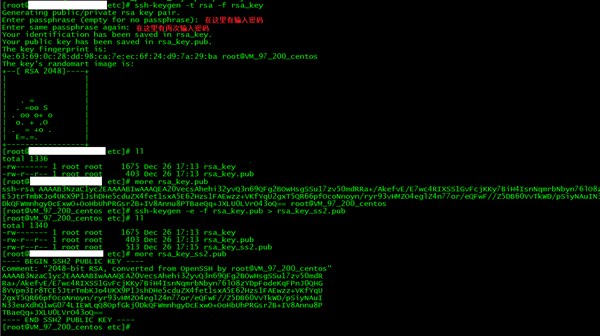在《在Linux下如何使用openssl生成RSA公钥和私钥对》一文中,讲述了在Linux环境下如何生成RSA公钥和私钥,但在Java中,我们又是如何去很好的用它们呢?下面我来看下两个案例,特别是RSA私钥的生成是有输入密码的(在生产环境上一般都应该是这样用的),即在产生密钥对时有输入密码,如输出了12345678。

一.加签验签
import java.io.File;
import java.io.FileReader;
import java.io.IOException;
import java.security.KeyPair;
import java.security.PrivateKey;
import java.security.Security;
import java.security.Signature;
import java.security.interfaces.RSAPrivateKey;
import java.util.Arrays;
import org.bouncycastle.jce.provider.BouncyCastleProvider;
import org.bouncycastle.openssl.PEMReader;
import org.bouncycastle.openssl.PasswordFinder;
import org.bouncycastle.util.encoders.Hex;
public class SignatureExample {
public static void main(String [] args) throws Exception {
Security.addProvider(new BouncyCastleProvider());
String message = "hello world";
File privateKey = new File("C:/Users/alexbi.WEBANK/Desktop/test/key");
KeyPair keyPair = readKeyPair(privateKey, "12345678".toCharArray());
Signature signature = Signature.getInstance("SHA256WithRSAEncryption");
signature.initSign(keyPair.getPrivate());
signature.update(message.getBytes());
byte [] signatureBytes = signature.sign();
System.out.println(new String(Hex.encode(signatureBytes)));
Signature verifier = Signature.getInstance("SHA256WithRSAEncryption");
verifier.initVerify(keyPair.getPublic());
verifier.update(message.getBytes());
if (verifier.verify(signatureBytes)) {
System.out.println("Signature is valid");
} else {
System.out.println("Signature is invalid");
}
}
private static KeyPair readKeyPair(File privateKey, char [] keyPassword) throws IOException {
FileReader fileReader = new FileReader(privateKey);
PEMReader r = new PEMReader(fileReader, new DefaultPasswordFinder(keyPassword));
try {
return (KeyPair) r.readObject();
} catch (IOException ex) {
throw new IOException("The private key could not be decrypted", ex);
} finally {
r.close();
fileReader.close();
}
}
private static class DefaultPasswordFinder implements PasswordFinder {
private final char [] password;
private DefaultPasswordFinder(char [] password) {
this.password = password;
}
@Override
public char[] getPassword() {
return Arrays.copyOf(password, password.length);
}
}
}二.通过JSch上传文件到SFTP,并从SFTP服务器上下载
import java.io.File;
import java.io.FileInputStream;
import java.io.FileOutputStream;
import java.io.FileReader;
import java.io.IOException;
import java.io.OutputStream;
import java.security.GeneralSecurityException;
import java.security.KeyPair;
import java.security.Security;
import java.util.Arrays;
import org.apache.commons.lang3.StringUtils;
import org.bouncycastle.jce.provider.BouncyCastleProvider;
import org.bouncycastle.openssl.PEMReader;
import org.bouncycastle.openssl.PasswordFinder;
import com.google.common.io.Closeables;
import com.jcraft.jsch.Channel;
import com.jcraft.jsch.ChannelSftp;
import com.jcraft.jsch.JSch;
import com.jcraft.jsch.Session;
public class SftpUtil {
public static final String PASSPHRASE = "12345678";
/**
* 上传文件
*/
public static void upload(String user, String ip, int port, String privateKeyPath, String remoteFileName,
String remoteFilePath, String localFileName) throws Exception {
ChannelSftp sftp = null;
FileInputStream input = null;
Session sshSession = null;
try {
Security.addProvider(new BouncyCastleProvider());
JSch jsch = new JSch();
sshSession = jsch.getSession(user, ip, port);
// 判断鉴权方式
jsch.addIdentity(privateKeyPath, PASSPHRASE);
sshSession.setConfig("StrictHostKeyChecking", "no");
sshSession.connect();
Channel channel = sshSession.openChannel("sftp");
channel.connect();
sftp = (ChannelSftp) channel;
if (sftp != null && sftp.isConnected()) {
File file = new File(localFileName);
input = new FileInputStream(file);
if(StringUtils.isNotEmpty(remoteFilePath)) {
sftp.cd(remoteFilePath);
}
sftp.put(input, remoteFileName);
sftp.quit();
}
} finally {
if (input != null) {
try {
Closeables.close(input, false);
} finally {
input = null;
}
}
if (sftp != null) {
try {
sftp.disconnect();
} finally {
sftp = null;
}
}
if (sshSession != null) {
try {
sshSession.disconnect();
} finally {
sshSession = null;
}
}
}
}
/**
* 下载文件
*/
public static void download(String user, String ip, int port, String privateKeyPath, String remoteFileName,
String remoteFilePath, String localFileName) throws Exception {
ChannelSftp sftp = null;
OutputStream output = null;
Session sshSession = null;
try {
Security.addProvider(new BouncyCastleProvider());
JSch jsch = new JSch();
sshSession = jsch.getSession(user, ip, port);
// 判断鉴权方式
jsch.addIdentity(privateKeyPath, PASSPHRASE);
sshSession.setConfig("StrictHostKeyChecking", "no");
sshSession.connect();
Channel channel = sshSession.openChannel("sftp");
channel.connect();
sftp = (ChannelSftp) channel;
if (sftp != null && sftp.isConnected()) {
if(StringUtils.isNotEmpty(remoteFilePath)) {
sftp.cd(remoteFilePath);
}
output = new FileOutputStream(localFileName);
sftp.get(remoteFileName, output);
sftp.quit();
}
} finally {
if (output != null) {
try {
Closeables.close(output, false);
} finally {
output = null;
}
}
if (sftp != null) {
try {
sftp.disconnect();
} finally {
sftp = null;
}
}
if (sshSession != null) {
try {
sshSession.disconnect();
} finally {
sshSession = null;
}
}
}
}
public static void main(String[] args) throws Exception {
//upload("sftpuser", "10.107.97.20", 57001, "C:/Users/bijian/Desktop/test/key", "a.txt", "", "C:/Users/bijian/Desktop/bijian.txt");
download("sftpuser", "10.107.97.20", 57001, "C:/Users/bijian/Desktop/test/key", "alexbi.txt", "", "C:/Users/bijian/Desktop/bijian02.txt");
}
}参考文章:https://stackoverflow.com/questions/1580012/using-a-pem-encoded-encrypted-private-key-to-sign-a-message-natively
